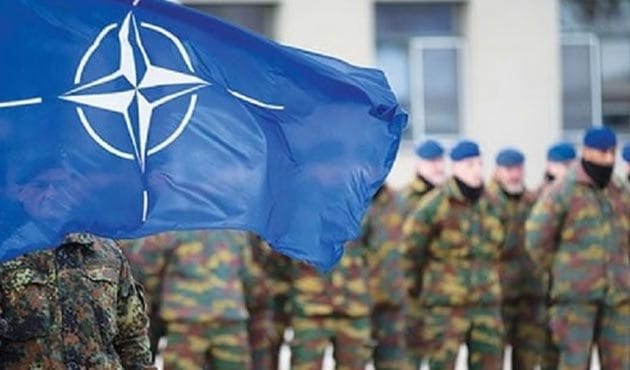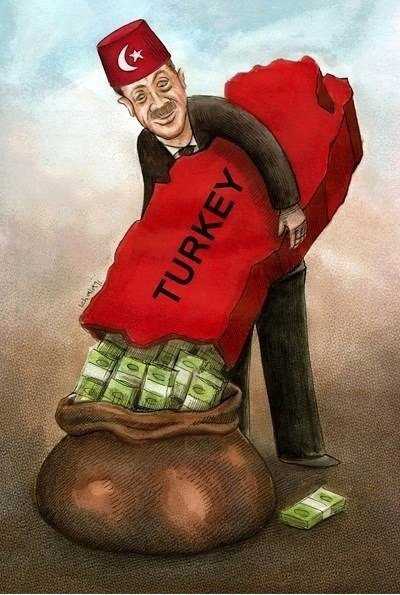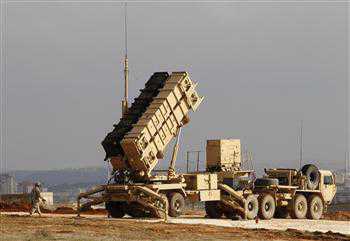
Turkey’s new role: From NATO lapdog to Emerging Empire
Gearóid Ó Colmáin
The recent Turkish coup attempt marks a turning point in NATO’s war on Syria. An emerging empire and portal to the orient, Turkey has always played a key role in NATO’s ‘Drang Nach Osten’- the drive to encircle Russia, destroy its client-states Syria and Ukraine, and serve as a bulwark against other emerging powers such as Iran. But now it seems Turkey may no longer be carrying out its designated role.
That the United States was behind the coup attempt there is little doubt, though some prominent analysts such as Thierry Meyssan disagree that the coup was orchestrated by Gülenists. Fethullah Gülen is known to be close to the CIA and the U.S. obmutescence during the coup was typical of standard procedure during U.S. covert regime change operations. While Erdoğan is unquestionably a war criminal who is responsible for the deaths of hundreds of thousands of innocents in Syria and Libya and heavy repression at home, nonetheless, as in the case of former Iraqi president Saddam Hussein, the Turkish leader seems to have fallen out of favour in the West. The media have already begun the predictable, clichéd demonisation process – publishing pictures of the Turkish incumbent’s opulent palaces etc. Turkey desperately needs a new, progressive regime, which would contribute to peace in the Middle East. But if the choice is between a monster the CIA wants out and a monster the CIA wants in, the latter is the best option as it weakens U.S. imperialism.
Turkey’s strategic imperatives
Stratfor director George Friedman claims Turkey is now a world power whose military is more powerful than the French or British. The U.S. strategy for Europe was to force Turkish entry into the EU – most recently through weapons of mass migration. The policy worked in Turkey’s favour. But the British decision to exit the European Union changed the balance of power. Moscow took the opportunity to extend the hand of friendship once more to Ankara. Just before the July 19th coup attempt, there were reports of a possible détente between Turkey and Syria.
U.S./Turkish relations have soured considerably since 2013 when U.S.-based billionaire Fethullah Gülen fomented the Gezi Park protest movement against the Recep Tayyip Erdoğan regime. Though there was certainly popular discontent in the country with Erdoğan’s Islamisation policies and his support for terrorism in Syria, the Gezi Park protests were really about pushing Gülen’s attempt to destabilise the regime and take over. Fethullah Gülen is the founder of a vast empire of private prep schools throughout the world. He promotes an extremist form of Islam.
Though originally close to Erdoğan’s Justice and Development Party (AKP), Gülen’s movement Hizmat (service) is less nationalist and therefore more amenable to U.S./Zionist interests. The Gülenist network operates as a fifth column in Turkey, a para-state operating at the highest levels of the military, intelligence and judicial apparatuses. I was asked by Russian state media RT to comment on the Turkish shooting down of a Russian jet in November 2015. I said then that the Turkish government was acting against the national interest. It has since transpired that the attack was carried out by Gülenist military personnel who have been prosecuted for the crime. President Erdoğan recently apologised to Russian President Vladimir Putin for the attack. In fact, Turkey had indicated on July 13th that it intended to normalise relations with Syria, thus ending the war against Assad. Contacts between Ankara and Damascus have been growing in recent months and it now looks like Russia and Turkey may have begun to mend relations. Southstream, Russia’s plan to pipe oil to Europe through Turkey, had to be abandoned last year due to U.S. pressure on Ankara. There is now a possibility of renegotiation recommencing between Moscow and Ankara. Recent Turkish/Iranian contacts also indicate that the Kurdish question is forcing Ankara to re-calibrate its foreign policy.
Although secret talks have reportedly been taking place between Ankara and Damascus, the two countries remain at war in Syria and there is no change yet in the official position of either state.
The geopolitical theories of Greek turkologist Dmitiry Kitsikis have had a major influence on Turkish foreign policy. Kitsikis is famous for promoting the notion of Turkey as a civilisation-state which naturally encompasses the region stretching from North Africa, through the Balkans and Eastern Europe; Kitsikis refers to this as the ‘Intermediate Region’. Turkey’s previous ‘good neighbourly’ policy seemed to be in accordance with Kitsikian geopolitics but was sabotaged by Ankara’s treacherous collaboration with U.S. chaos strategy in the Middle East since the U.S.- fomented ‘Arab Spring’ in 2011.
U.S. policy towards Turkey has always been to support the regime as a strong regional power to wield against Russia while at the same time supporting the Kurdish YPG (people’s defense units) in Syria. U.S. support for the Kurds is part of the long-term geopolitical remodeling of the region – the creation of what former U.S. Secretary of State Condoleeza Rice at the start of the ‘Arab Spring’ uprisings in 2011 referred to as the “New Middle East”. The U.S. and Israel want to carve out a Kurdistan in the region, which would become a client-state of Israel; thus providing the Zionist regime with an effective proxy army against its Arab enemies – once the Da’esh-fomented genocide has created the requisite Lebensraum.
Erdoğan’s ambitions of reviving the Ottoman Empire in the Middle East ultimately threaten U.S. hegemony. The United States Navy rules the waves. The U.S. will not allow another major maritime power to threaten its global control. Rapid economic growth and the paying off of its IMF debt in 2013 have seen Turkey emerge more and more as a strategic regional power with increasing independence and political assertiveness. Turkish investment in Africa has increased more than ten-fold since 2000. The Turks have opened embassies all over Africa. Ankara is selling the notion of ‘virtuous power’ in Africa with infrastructural development projects and investments designed to compete with China and the United States. Turkish involvement in Somalia has turned the East African nation into a veritable client-state of the emerging Turkish Empire. In 2015 Turkey opened a military base in Somalia. Turkey will henceforth have a strategic reach in the Gulf of Aden, one of the most important oil choke-points in the world. Ankara also has plans to establish military bases in Azerbaijan, Qatar and Georgia.
The Turkish regime has been attempting to oust the presence of the Gülenist movement in many African countries by offering to supply state funds for education programmes. A recent statement by a Turkish government spokesman alluded to Ankara’s desire to counter Western ‘neo-colonial’ interests in Africa. The statement clearly shows that Turkey intends to join the new ‘scramble for Africa’ as part of neo-ottoman imperialism.
Turkey in Central Asia and China
Turkey has considerable power and influence in Central Asia where many Turkic-speaking people reside. In 2009, Turkey helped found the Cooperation Council of Turkic Speaking States. Turkish investment has been increasing in Central Asia. Ankara has also been training military personnel in Central Asian states. The oil-rich Turkmenistan is one nation which has received visits in recent years from the ‘Sublime Porte’. During its spat with Moscow, Ankara sought to deepen ties with Turkmenistan in hopes of enticing that state to participate in the Trans-Caspian Pipeline – a project to pipe gas from the Caspian Sea through Turkmenistan, Azerbaijan and Turkey to Europe, thereby bypassing Russia. Turkey also has considerable influence in Turkic speaking regions of the Russian Federation such as Tartarstan. Though relations with Moscow have now improved, Ankara’s links in Central Asia remain key strategic levers in the renaissance of Turkish imperialism.
Turkey’s links with Uighur terrorists in China’s troubled Xinjiang (East Turkestan) province has led to diplomatic rows with Beijing. Many of the Uighur terrorists operating against China have been trained and facilitated by Turkey in Syria. Although Turkey’s support for Uighur terrorists in Xinjiang complies with NATO policy towards China, it shows once again the potential reach of Turkish power.
Turkey’s drive for world power status, together with the decline of Europe as a political entity, means that Ankara will continue to flex its muscles in the international arena. The French Foreign Minister Jean-Marc Ayrault has said that Turkey is no longer a reliable partner in NATO’s fight against the Islamic State. Of course, Ankara was never a partner in the war against the Islamic State as the Turkish regime has been arming and training the Islamic State terrorists along with its NATO partners and has been caught in flagrante delicto on several occasions. But what the French Foreign Minister’s remarks mean is that Turkey may no longer be as sanguine in its support for terrorism in Syria, due to the West’s support for the Kurds; rapprochement with Moscow and Damascus, and now more than ever after the failed U.S.-backed coup attempt.
Israel’s double game
The situation is further complicated by Israel’s stance towards the Turkish coup attempt and its aftermath. The Turkish regime thanked Israel for its help quashing the coup. Relations between Tel Aviv and Ankara have improved, in spite of the current dispute with Washington. One should not overlook the fact that, although the Israeli Lobby exerts considerable control over U.S. foreign policy, Israel often adopts a friendlier attitude to many of America’s so-called enemies. Israel’s relationship with Belarus has always been generally good, in spite of repeated U.S. aggression. Israel’s relationship with Azerbaijan has been good, in spite of major diplomatic rows with the U.S..
Israeli/Russian relations are far better than Moscow’s relationship with Washington. Israel has always had a more nuanced oriental policy than the U.S. The Israelis are masters at playing both sides off each other in international conflicts. During the Iran/Iraq war of the 1980s, the U.S. supported Saddam Hussein’s regime while Israel eventually provided Israel covert supplies of weapons to Iran with on U.S. approval. The Israelis had established ties with Iranian fifth columnists Mir-Hossein Moussavi and Hachemi Rafsanjani. The aforementioned Stratfor director George Friedman has said that the Iran/Iraq war would be a template for dealing with the rise of Turkey as a world power.
A rising maritime power in trouble?
Turkey will pay dearly for the folly of abandoning its ‘good neighbourly’ regional policy, which showed some promise until 2011. It had a glorious opportunity then to exercise ‘virtuous power’. Now the country could be facing civil war. The purge of Gülenists in the Turkish regime has already led to hundreds of arrests of top military and government personnel. If Turkey is to emerge as a regional empire, it will have to leave the Zionist axis and find a solution to the Kurdish question in conjunction with Syria and Russia. It is currently beginning to appear that previous secret plans agreed upon by Ankara and Paris to carve out a Kurdish state in Northern Syria may have to be abandoned. As the French escalate bombing of Raqqa in Syria in the wake of the Nice terrorist psyops, Turkey could be facing an acute state of emergency.
The United States cannot tolerate the emergence of a major maritime power like Turkey which, since the Cold War, has been used as a tool against Russia. Turkey’s Incirlik Airbase holds up to 80 percent of Washington’s nuclear arsenal in Europe. A significant oriental shift in Ankara’s foreign policy would signal the end of America’s prospects of ‘full spectrum dominance’, creating the conditions for a new imperial division of the world- a geopolitical reconfiguration some might imagine as falling in with conjectures of a Moscow/Constantinople axis or, in mytho-historical terms, a ‘Third Rome’.
It is possible that the U.S. already sees that a reconfiguration of imperialist alliances is necessary with the influential former U.S. National Security Advisor Zbigniew Brzezinski advocating a détente in U.S. relations with Russia and China. What is clear from recent events in Turkey is that the world imperialist system is going through seismic changes, with old military alliances breaking down and new configurations of imperial power emerging. What prospect exist for global,working-class liberation in a period of deepening capitalist crisis and war remain to be seen.
Ahttp://www.gearoidocolmain.org/
bout Gearóid Ó Colmáin

Gearóid Ó Colmáin is an Irish journalist and political analyst based in Paris. His work focuses on globalisation, geopolitics and class struggle.







